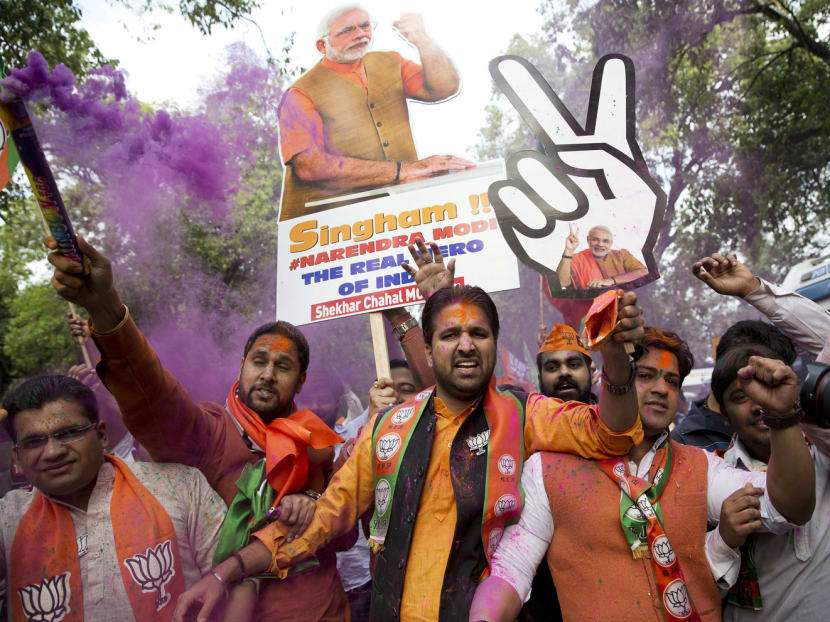Big win in state election paves way for Modi’s economic push
NEW DELHI — With an overwhelming victory in India’s most important state election, Prime Minister Narendra Modi has secured his place as the country’s most influential leader in more than three decades, eclipsing his rivals and positioning his party for a second term in 2019.

Bharatiya Janata Party (BJP) supporters celebrating the party’s state election wins on Saturday. The strength of Indian Prime Minister Narendra Modi’s mandate shows his appeal remains powerful nearly three years after he swept to power. Photo: AP
NEW DELHI — With an overwhelming victory in India’s most important state election, Prime Minister Narendra Modi has secured his place as the country’s most influential leader in more than three decades, eclipsing his rivals and positioning his party for a second term in 2019.
His Bharatiya Janata Party (BJP) won a clear majority in Uttar Pradesh — home to one in six Indians — that will allow Mr Modi to aggressively push his economic agenda, although he will still face entrenched opposition to some reforms in the Upper House of Parliament.
Jubilant crowds of saffron-clad supporters celebrated the victory outside the party’s headquarters in New Delhi and in Lucknow, the capital of Uttar Pradesh. The strength of his mandate shows Mr Modi’s appeal remains powerful nearly three years after he swept to power with the largest majority in 30 years.
“Modi represents that national-level figure that we’ve not seen since Indira Gandhi,” said Dr Sandeep Shastri, a political scientist and pro-vice chancellor of Bengaluru’s Jain University, referring to India’s most popular prime minister.
The BJP and its coalition partners won 311 seats in Uttar Pradesh’s 403-member assembly, according to the Election Commission of India, up from 47 seats in 2012 and bringing it to power for the first time since 2002.
The BJP also won in the northern state of Uttarakhand, but its ally was ousted in the agricultural state of Punjab by the Congress Party. It is unclear who will form government in the smaller states of Goa and Manipur.
This election sets the tone for the politics of the next 24 months, said Dr Shastri, noting that as the party battles a series of state elections in Gujarat and elsewhere, the victory “puts the BJP at a decisive advantage”.
“The prime minister’s hand has been strengthened” to implement bold policy reforms. He will likely try for some measures in the coming months that will capture the imagination of voters that will help him win in 2019.
This has raised hope among investors that the BJP will embark on new reforms to boost growth in Asia’s No 3 economy, and try to tackle the corruption and red tape that has long undermined India’s potential.
Investors can expect pro-business reforms in Uttar Pradesh, such as digitising land records and making permit applications easier, said Mr Jan Zalewski, a senior Asia analyst at Verisk Maplecroft.
“Reforms may also yet encompass entirely unexpected and out-of-box moves, along the lines of demonetisation,” he said. “Modi’s inclination to draft such moves behind closed doors means that policy predictability will be low on that front.”
Mr Modi will “aggressively expedite” key structural economic reforms that will promote India’s growth, said Mr Ajay Bodke, CEO at Mumbai-based brokerage Prabhudas Lilladher. The passage of the national sales tax “is a mere formality now”.
However, some cautioned that Mr Modi’s biggest task remains transforming India’s economy into one that creates enough jobs for an emerging generation that is desperate to give up life on farms.
“Jobs is the biggest risk,” said Mr Rajiv Kumar, an economist at the Delhi-based Centre for Policy Research. “That’s where he has to focus very hard and it could mean reforms as radical as demonetisation.”
As the battle for the state intensified, the BJP’s competitors relied on the idea that Mr Modi’s Nov 8 decision to withdraw high denomination notes from circulation in a bid to tackle corruption was unpopular and that people would vote against it.
“On the contrary, Modi and his team have managed to sell the policy as a good thing, warts and all,” said Mr Michael Kugelman, senior associate for South Asia at the Washington-based Woodrow Wilson Center.
India’s rural poor, who bore the brunt of the note ban, emerged as surprising supporters of the policy, based on a belief that Mr Modi’s actions would even out the scale of inequality and reduce corruption.
BJP president Amit Shah credited Mr Modi’s pro-poor policies for this landslide win. The mandate will change the course of the country’s politics and herald a “new era of the politics of performance” over the politics of caste, he said.
The outcome will enable Mr Modi to sharpen his anti-corruption moves, said Mr Shailesh Kumar, senior Asia analyst at political risk form Eurasia. “This will manifest in additional policies aimed at cleaning areas such as real estate, gold, and campaign finance,” he said.
However, the BJP would not be able to secure a majority in the Upper House, leaving difficult legislative changes such as federal land and labour reforms potentially out of his reach, he added.
With such a large mandate, some commentators warn the government’s power could go unchecked.
Mr Modi’s increasing centralisation of political powers will impact the autonomy of key institutions, such as the judiciary and the central bank, which could be perceived as obstacles to the reform progress.
“This victory gives him power and influence, both within the party and the government, that could go unchallenged,” said Dr Shastri. “That could also be a factor that leads to developments and practices that, to a certain extent, could be unaccountable.” AGENCIES






